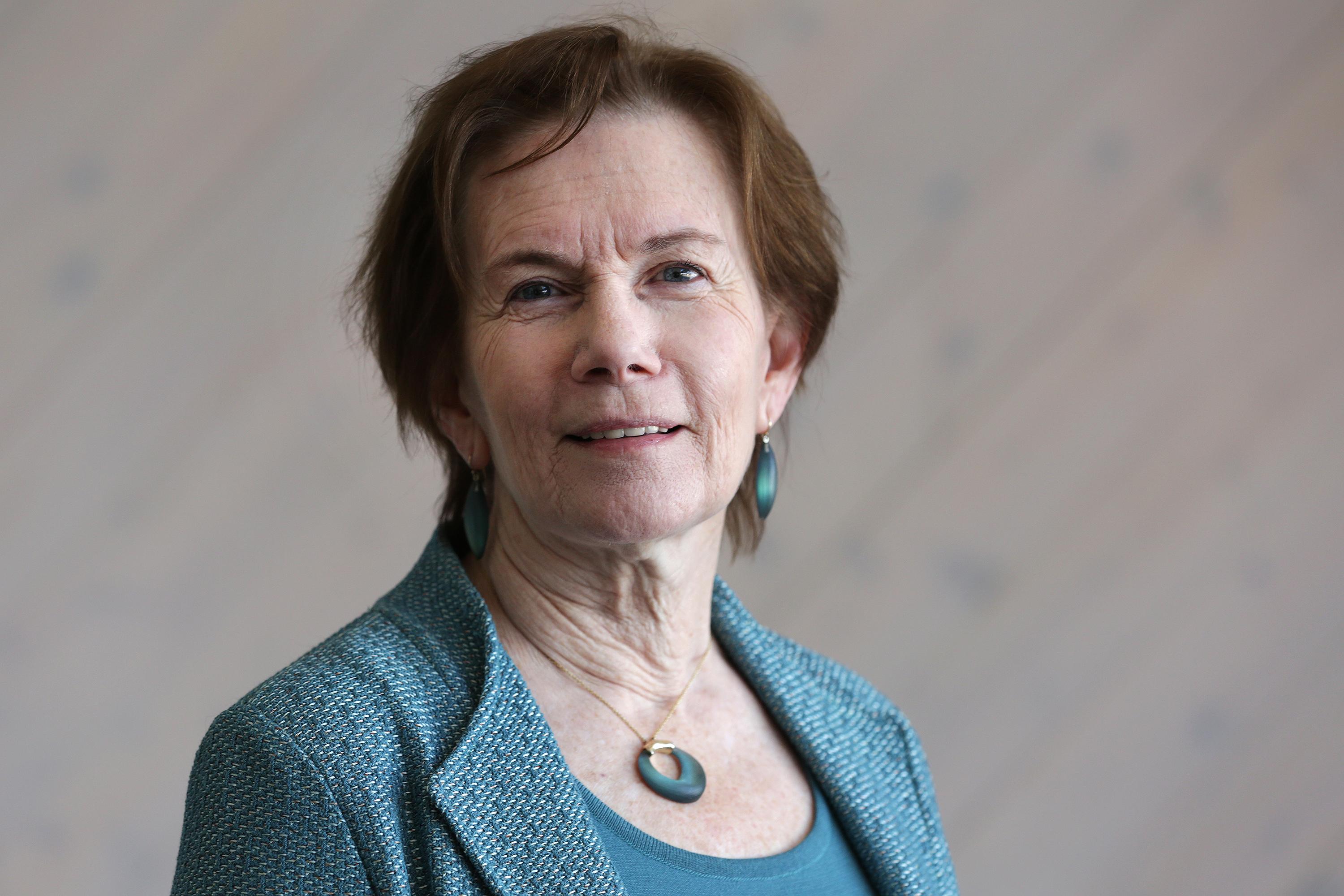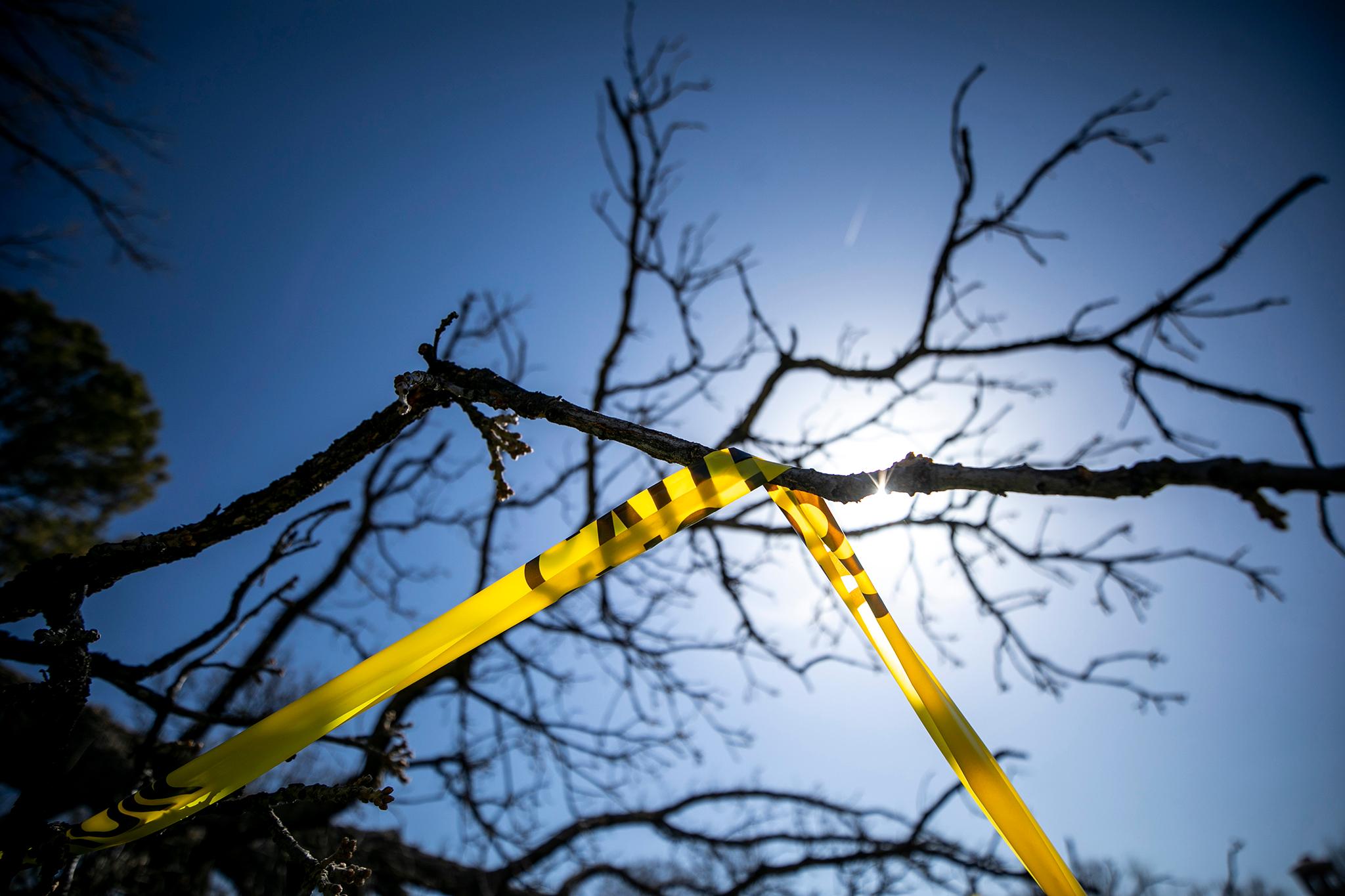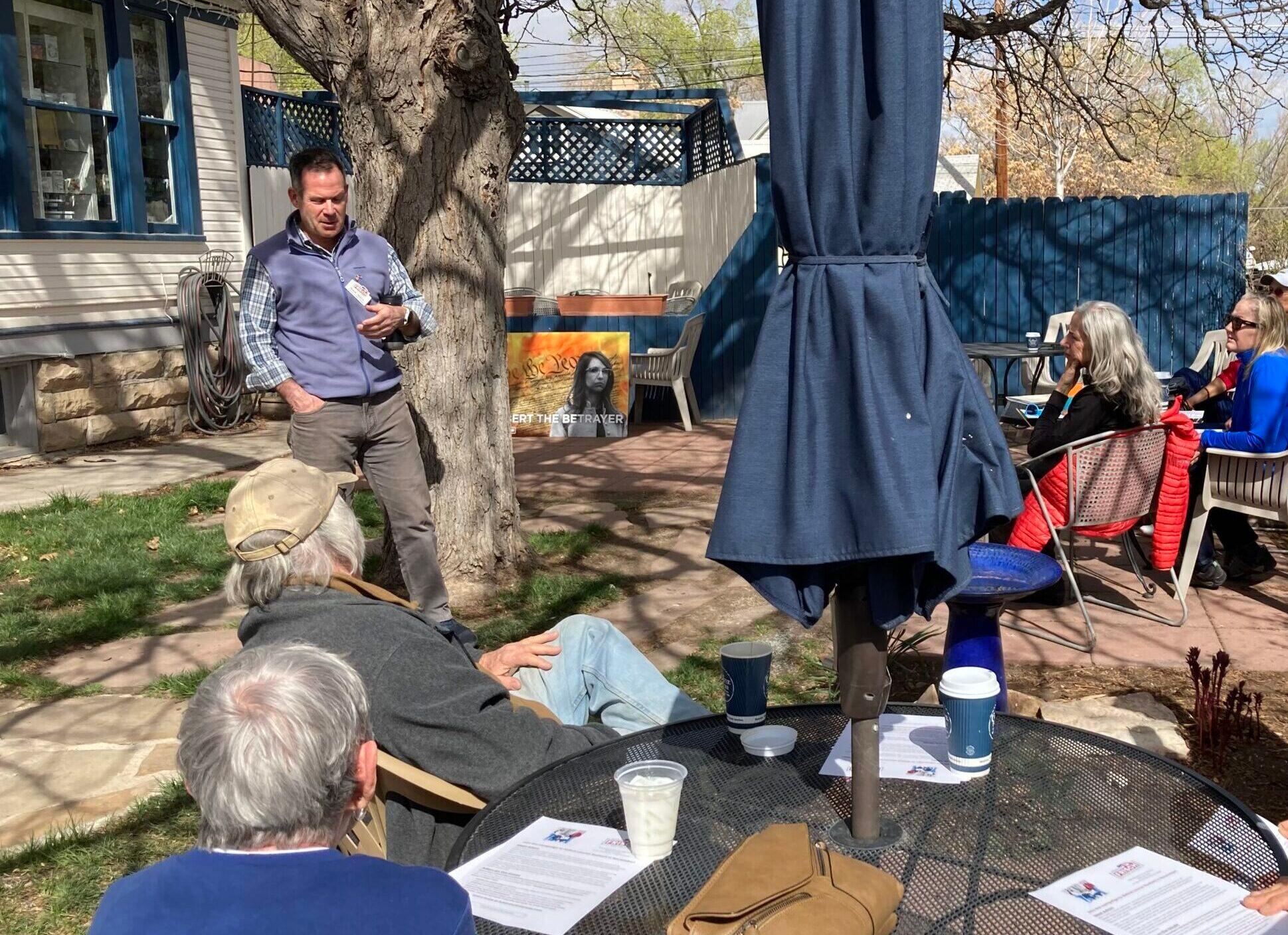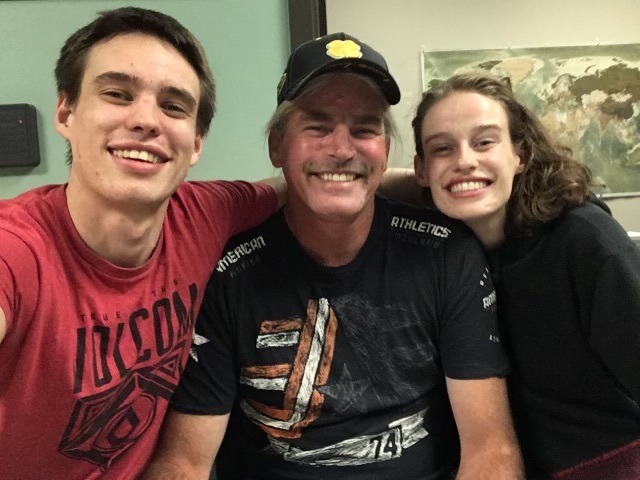

After a year on the job, Lieutenant Gov. Donna Lynne has toured every county in the state. In rural areas, she says she's heard two recurrent themes: The need for better internet service to promote economic development, and the need for cheaper, more competitive health care insurance.
The internet issue just got a $9.5 million boost in a budget compromise in the legislature. The health care issue dovetails with Lynne's previous career as chief executive officer of the Kaiser Permanente health system in Colorado.
Lynne was confirmed as lieutenant governor a year ago this week, replacing Joe Garcia, who resigned for a higher education job. She spoke with Colorado Matters host Ryan Warner.
Highlights of the conversation:
Key issues she heard in rural areas:
"I would say they consistently came back with about three or four issues. The cost of health care in rural Colorado is way in excess of what it is in the Front Range … The second issue is broadband, and the need for broadband, just to basically do their work. The third is affordable housing, and I would say the fourth is, the whole drug issues that they have in those counties. Some of them are the grey market and marijuana, but some of it are the opioid problems that are particularly prevalent in our rural counties.
On how the state will spend $9.5 million allocated for high-speed internet:
Well, first of all, $9.5 million, which is great, doesn't really solve the problem. We only have about 75 percent of our rural households having broadband, and we want to get to 100 percent. That will probably cost about $125 million over the next few years to get there . . . it's a beginning, and we have a broadband fund, where we support some of the rural communities that come forward with plans. So, one by one, I think we're going to make a dent, but we have a long way to go.
On prospects for a bill to change funding for rural hospitals (hospital provider fee) and provide additional money for other state services:
There have been a number of attempts both at a transportation bill, at a hospital provider fee bill, and I think it’s coming together. We’re knitting this together very closely with the senate and the house, and I think we’re making a lot of progress.
On the possibility of a special legislative session:
I think it’s possible. It’s not preferred, because we’d just as soon get everything done now that we have to get done, especially the hospital provider fee.
Ryan Warner: This is Colorado Matters from CPR News, I'm Ryan Warner. From Adams to Yuma, Colorado has 64 counties, and in her first year in office, Lieutenant Governor Donna Lynne, has visited all of them. She is trying to help her boss, Governor John Hickenlooper take Colorado's pulse. Welcome to the program.
Lieutenant Governor Donna Lynne: Thanks Ryan, great to be here.
RW: I want you to take me to a place you visited on this tour that stands out in your mind, perhaps an issue that was brought up there.
DL: Sure. It's pretty hard to narrow it down with 64, I did learn how to drive a tractor in Cheyenne Wells, that sticks out in my mind for very different reasons. One county that certainly comes to my mind is, Rio Blanco County, where there's a lot of coal mining, and that's important to the economy there, but the Department of Natural Resources also works with the coal mine on reclamation, so seeing that balance of the importance of some of these jobs in those communities, to also preserving our environment, was quite striking for me. I was in Morgan County and saw how our energy office helps make dairy farmers do their work more efficiently, which is really important given how much they consume in terms of electricity.
RW: Some of these counties are not necessarily Democratically friendly territory, would you say?
DL: That's correct.
RW: What did you hear, for instance from, did you meet coal miners themselves in Rio Blanco County?
DL: I did meet coal miners, but throughout the entire rural area of Colorado, I was fortunate, not only to just meet state employees, who were providing services in those counties, or county employees, but also with county commissioners and mayors, and I would say they consistently came back with about three or four issues. The cost of health care in rural Colorado is way in excess of what it is in the Front Range.
RW: And they've lost insurers, they've lost choice.
DL: Absolutely. The second issue is broadband, and the need for broadband, just to basically do their work. The third is affordable housing, and I would say the fourth is, the whole drug issues that they have in those counties. Some of them are the grey market and marijuana, but some of it are the opioid problems that are particularly prevalent in our rural counties.
RW: Why don't we get to some of those issues individually. So, as you say, high speed internet is very important to these communities. I'll say that the legislature's most recent budget compromise allocates $9.5 million for that. Where will that money go?
DL: Well, first of all, $9.5 million, which is great, doesn't really solve the problem. We only have about 75% of our rural households having broadband, and we want to get to 100%. That will probably cost about $125 million over the next few years to get there.
RW: I see, so that's not even 10 percent of it.
DL: That's right, but it's a beginning, and we have a broadband fund, where we support some of the rural communities that come forward with plans. So, one by one, I think we're going to make a dent, but we have a long way to go.
RW: And they see that, I know, in rural Colorado, very much as a potential job creator don't they?
DL: Absolutely. More and more people are living and working at home, our rural schools need broadband access to do internet searches and to do exams, and importantly, our rural hospitals and health clinics need broadband, because if you don't have specialists in those communities, they do rely on communication with specialists in the Front Range, for example.
RW: To the cost of healthcare and the narrowing choices of insurance providers, what did you tell them?
DL: Well what I told them was, actually I've been working with a number of rural lawmakers over the last six, seven months, to come up with some solutions to, in fact subsidize the premiums that people in rural areas pay, through our individual exchange, actually 47 counties would have been affected by that. Unfortunately it didn't make it out of the senate committee that it was assigned to.
RW: These would be subsidies in addition to the ones that already exist on the exchange, you say?
DL: That's correct, because people at 400 percent of poverty, still have a tough time affording health care in those rural communities.
RW: So, tough totes you tell those folks, given what happened to that legislation?
DL: Yeah, I think it's not something that we're going to give up on. This administration believes that healthcare should be affordable for all, that we should be transparent with our consumers, so they can shop in an informed way, and we've got some opportunities to continue to work on that going forward.
RW: What perspective did this tour of all of Colorado's counties, Lieutenant Governor Donna Lynne, what perspective did it give you on the urban/rural divide, the divisions we've seen before and after the election?
DL: You know, not a lot of people talked about the November 8th election. What they did talk about, was the fact that the recovery was somewhat uneven, and I think we're very proud of the fact that our unemployment rates statewide is 2.6 percent, the lowest it's been in the 41 years it's been collected. But we know in some of our rural communities it's double that. We know our rural communities are having a hard time hiring teachers for example, and I think we're continuing to look at those issues, because I know the governor believes, and I believe, you can't just have a recovery and a vibrant economy in the Front Range.
RW: What are some other ways you're looking at boosting those economies?
DL: We do give grants for some basic infrastructure needs. Some of that comes from the marijuana tax for example, to support our rural school physical infrastructure.
RW: Yeah that's not to be used for hiring teachers for instance.
DL: That's correct, it's just for the infrastructure itself, the buildings. The other thing is, our Department of Local Affairs, works on infrastructure needs, it could be sewer plants, it could be town halls, it could be, there's some broadband money that comes through there, so between the Department of Local Affairs, and our Economic Development Office, we really are looking at, how do we give incentives to people in those regions? Whether, it’s new jobs, or it's the infrastructure that they would otherwise have to divert tax revenue to.
RW: We spoke recently with the head of tourism for Colorado, who also talked about the unevenness in some ways, of visitors, they often go to the mountain communities, to the resorts, and I know that there is some interest in attracting people to places in Colorado that don't often see tourists, or as much.
DL: That's absolutely true. In fact, I just led a leadership initiative with our tourism office, where we're beginning to train people outside of the core mountain areas, on how to develop some attractions in those communities.
RW: Their history, their interesting buildings, something like that?
DL: Absolutely. We've got mining that's occurred across the state, and there's a rich history with that. We have some great old railroads, like the Galloping Goose, that really give you a sense of history throughout the state.
RW: I want to say that before you took this job as lieutenant governor a year ago now, you were president of Kaiser Permanente in Colorado, and Governor Hickenlooper often says he relies heavily on your expertise. I do want to ask, in the realm of healthcare and rural hospitals in particular, there are really intense negotiations right now, around a piece of legislation to fund rural hospitals. Without it, some say they may close, there apparently is even a version of this bill, that has emerged this morning. What can you tell us about these negotiations?
DL: We do have eight more, nine more days left in the session, so, and as you know, things get pretty intense as we get further on. This is really the number one priority of the governor in terms of this legislative session. We know that we need to recognize the hospital provider fee is an enterprise fund that’s -
RW: This is an accounting change that would free up money in the budget.
DL: That’s right. It frees up money in the budget for other things, but it also restores some of these planned cuts or proposed cuts for some of our rural hospitals, and actually even in the Front Range for Denver Health.
RW: Transportation also included, I think, and some education money as well. Are you optimistic that there can be a compromise? Democrats and Republicans have not seen eye to eye on this particular front.
DL: I think we’re optimistic because as you mentioned, many of the rural hospitals are in senate districts that are led by Republicans, and they clearly understand the importance of those rural hospitals to their communities.
RW: But if that were a motivator wouldn’t there already be a deal?
DL: There have been a number of attempts both at a transportation bill, at a hospital provider fee bill, and I think it’s coming together. We’re knitting this together very closely with the senate and the house, and I think we’re making a lot of progress.
RW: You’re listening to Colorado Matters. I’m Ryan Warner, and I’m joined by Colorado’s Lieutenant Governor, Donna Lynne, who is under the Democratic Governor, John Hickenlooper. RW: So the governor and others have talked about a system that might allow insurance companies to sell policies across state lines. The idea is to increase the number of customers and competition. I wonder if any neighboring states have indicated that they would join a regional exchange. DL: Yes, so just to be clear, there’s sort of two different issues. One is selling insurance across state lines, doesn’t do a whole lot. You still have to have a network in Colorado. What it does allow you potentially to do is get away from mandates that an individual state provides. The regional exchange is a separate matter that applies to the roughly 175,000 people that we have who are individuals who buy insurance through what we call Connect For Health Colorado. RW: And who may have lost choice on the exchange.
DL: They have. Although on our exchange, unlike some of the others in this other states, we have 13 health plans in Colorado that currently in 2017 are on our exchange. The idea of a regional exchange would be there are some states that participate in the federal exchange, and if what’s going on in Washington could potentially eliminate the federal exchange, our exchange has been so successful, we stand ready to help out states like Wyoming, or Utah and say, “Come on into our exchange. We think we can provide great customer service and efficiency in offering plans to the individual people in your state.”
RW: So those conversations are ongoing?
DL: We’ve been having some of those conversations. Again, if you live in Utah you’re not going to use a network in Colorado, so you still need to have the relationships with doctors and hospitals in Utah, for example.
RW: But the infrastructure of the exchange might benefit another state.
DL: That’s right. Enrolling people, answering their questions and things like that. RW: Although our exchange in Colorado has been the subject of some audits and some review, and there have been in the past findings that it has not been well managed. DL: Yeah, I think the federal government does those sort of routine audits, looked at some of the startup cost, but I think we’re very proud of the work that Connect For Health has done, and reduced their costs actually over the last several years. RW: I want to bring up an issue that you heard on your tour of Colorado’s counties and that is addiction to opioids. In 2015 opioid deaths outnumbered murders in Colorado. This is a particular problem in rural areas as you heard. What is the next step the state should try to take to lower addiction rates? DL: I think the state's taking a couple of steps. First of all, one is just general awareness. I think there isn’t a day that goes by that you can’t read about this in the paper, hear about it on the radio, or listen to the television. We have something called a “prescription drug monitoring program” in Colorado which requires physicians who issue opioid prescriptions for pain to register. And we have begun and will continue to disseminate information to a doctor so that he or she knows, “Wow, Donna came in and she already has four of these prescriptions. Maybe I ought to not issue her another one.” The other part is -
RW: Is there any sense that that’s working?
DL: We’ve got a significant number of doctors who have registered for it and use it, and it’s been proven in other states to actually reduce opioid use. Many states actually have some limits on the number of pills that a physician can prescribe. We don’t do that in Colorado, but we are looking at other ways that we can expand treatment and as I said general awareness on the opioid problem.
RW: Are you looking for more doctors to be a part of that tracking system?
DL: Well right now it’s mandatory to sign up to be part of the tracking system, but it’s not mandatory to use it once you’ve signed up. I think that is a place that other states have gone, and working with our physician community I think it is an alternative that we’re going to explore.
RW: The mandate of checking it?
DL: Mm-hmm (affirmative).
RW: Okay. So we might see legislation around that in the future?
DL: That’s right.
RW: When you became lieutenant governor you also took on the role of chief operating officer. One of the things you talked about when you first took office was trying to plan beyond the one year budget that the state now uses. How would that work?
DL: I think as a chief operating officer of any business, and I think the state of Colorado is like a business with a $28 billion budget, you can’t just lurch from event to event or crisis to crisis, and being able to understand what’s my trajectory in terms of our revenues, what’s my trajectory in terms of the demands on the state, while we haven’t formally proposed anything like a multiyear budget -
RW: Do any states do multi-year budgeting?
DL: They do actually. They may not call it a budget. They may call it a financial plan versus a budget. It allows you to anticipate trends that are going on in Washington, for example. It allows you to anticipate what we may know about how our state’s changing demographically. One great issue is so we’re getting older in Colorado and our tax revenue is going to go down because older people pay less taxes because, partly because they are not working anymore. So we’ve got a look at our demographics and other characteristics when we think about the long-term impact on revenue.
RW: And so any sense that there could be an implementation of multi-year budgeting in the future?
DL: You know we haven't, as I said, we haven’t had that explicit conversation. I think internally we do some of that planning and we’ll certainly advise our legislators about longer-term forecasts.
RW: Yes or no: Is a special session of the legislature possible given the big issues that are running down the clock?
DL: I think it’s possible, it’s not preferred, because we’d just as soon get everything done now that we have to get done, especially the hospital provider fee.
RW: Thank you for being with us. DL: You’re welcome. RW: Donna Lynne has been Colorado’s Lieutenant Governor for a year now, formerly she was president of Kaiser Permanente Colorado. She recently finished a tour of all 64 counties in the state. Lynne succeeded Joe Garcia, who resigned last year to take a job in higher education. This is Colorado Matters from CPR News.
|









